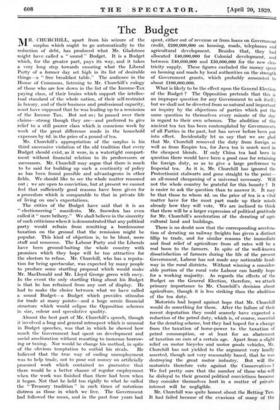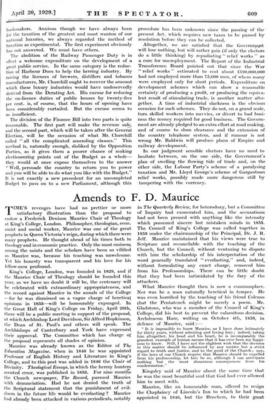The Budget
MR. CHURCHILL, apart from his seizure of the , surplus which ought to go automatically to the reduction of debt, has produced what Mr. Gladstone might have . called a " sound " Budget. It is a Budget which, for the greater part, pays its way, and it takes a very long step towards ensuring, what the Liberal Party of a former day set high in its list of desirable things—a " free breakfast table." The audience in the House of Commons, listening to Mr. Churchill's eulogy of those who are low down in the list of the Income-Tax paying class, of their brains which support the intellec- tual standard of the whole nation, of their self-restraint in luxury, and of their business and professional capacity, must have supposed that he was leading up to a remission of the Income Tax. But not so ; he passed over their claims—strong though they are—and preferred to give relief to a still poorer class which is conscious week by week of the great ,difference made in the household expenses by 4d. in the price of a pound of tea. - Mr. Churchill's appropriation of the surplus is his third successive violation of the old tradition that every Budget should exist, as it were, in a watertight compart- ment without financial relation to its predecessors or successors. Mr. Churchill may argue that there is much to be said for building up such a continuity of policy as has been found possible and advantageous in other fields. We should like to see the whole matter reasoned out ; we are open to conviction, but at present we cannot feel that sufficiently good reasons have been given for a procedure which is comparable to that in private life of living on one's expectations.
The critics of the Budget have said that it is an " electioneering " manifesto. Mr. Snowden has even called it " mere bribery.' We shall believe in the sincerity of such criticisms when it is demonstrated that any political party would refrain from remitting a burdensome taxation on the ground that the remission might be popular. This kind of objection is, to be blunt, mere stuff and nonsense. The Labour Party and the Liberals have been ground-baiting the whole country with promises which they hope will be too attractive for the electors to refuse. Mr. Churchill, who has a reputa- tion for being spectacular, was expected by many people to produce some startling proposal which would make Mr. MacDonald and Mr. Lloyd George green with envy. In the event the only startling thing about his Budget is that he has refrained from any sort of display. He had to make the choice between what we have called a sound Budget—a Budget which provides stimulus for trade at many points—and a huge scenic financial structure which would eclipse the Opposition schemes in size, colour and speculative quality.
Almost the best part of Mr. Churchill's speech, though it involved a long and general retrospect which is unusual in Budget speeches, was that in which he showed how much the Government had spent on development and social amelioration without resorting to immense borrow- ing or taxing. Nor would he change his method, in spite of the obvious temptation to outbid his rivals. He believed that the true way of ending unemployment was to help trade, not to pour out money on artificially procured work which contained no guarantee that there would be a better chance of regular employment when the work was finished than there had been when it began. Not that he held too rigidly to what he called the " Treasury tradition " in such times of notorious distress as those in which we live. The Government had followed the mean, and in the past four years had spent, either out of revenue or from loans on Government credit, 1260,000,00 on housing, roads, telephones and agricultural development. Besides that, they had allocated £40,000,000 for Colonial development, and between £40,000,000 and £50,000,000 for the new eke., tricity supply. These figures excluded the money spent on housing and roads by local authorities on the strength of Government grants, which probably amounted to about /100,000,000.
What is likely to be the effect upon the General Election of the Budget.? The Opposition pretends that this is an improper question for any Government to ask itself ; but we shall not be diverted from so natural and important an inquiry by the objections of parties which put the same question to themselves every minute of the day in regard to their own schemes. The abolition of the ancient tea tax has been contemplated by Governments of all Parties in the past, but has never before been put into effect. Incidentally let us say that we are glad that Mr. Churchill removed the duty from foreign as well as from Empire tea, for Java tea is much used in the cheapest blends. If only China tea had been in question there would have been a good case for retaining the foreign duty, so as to give a large preference to Imperial tea. As it is, Mr. Churchill has ignored the Protectionist stalwarts and gone straight to the point— an all-round cheapening of a universal necessary. Will not the whole country be grateful for this bounty ? It is easier to ask the question than to answer it. It may be that those to whom 4d. on the price of tea is a vital matter have for the most part made up their min& already how they will vote. We are inclined to think that there will be a larger expression of political gratitude for Mr. Churchill's acceleration of the derating of agri- cultural land and buildings.
There is no doubt now that the corresponding accelera- tion of derating on railway freights has given a distinct fillip to trade, and for similar reasons the immediate and final relief of agriculture from all rates will be a real boon to the farmers. In spite of the well-known dissatisfaction of farmers during the life of the present Government, Labour has not made any noticeable head- way in the rural districts. Without winning a consider- able portion of the rural vote Labour can hardly hope for a working majority. As regards the effects of the Budget on the General Election, therefore, we attach primary importance to Mr. Churchill's decision about agriculture, though it is less striking than the abolition of the tea duty.
Motorists had hoped against hope that Mr. Churchill would do something for them. After the failure of their recent deputation they could scarcely have expected a reduction of the petrol duty, which is, of course, essential for the derating scheme, but they had hoped for a change from the taxation of horse-power to the taxation of petrol consumption, or at least for an abatement of taxation on cars of a certain age. Apart from a slight relief on motor .bicycles and motor goods vehicles, Mr. Churchill has not yielded to the argument very loudly asserted, though not very reasonably based, that he was destroying the great motor industry. But will the motorists therefore vote against the Conservatives ? We feel pretty sure that the number of those who will be disloyal to their general political convictions because they consider themselves hurt in a matter of private interest will be negligible. Mr. Churchill was quite honest about the Betting Tax. It had failed because of the evasions of , many of the bookmakers. Anxious though we have always been for the taxation of the greatest and most wanton of our national luxuries, we always regarded the method of taxation as experimental. The first experiment obviously has not answered. We must have others.
The abolition of the Railway Passenger Duty is in effect a welcome expenditure on the development of a great public service. In the same category is the reduc- tion of Harbour Dues to help the herring industry. By raising the licences of brewers, distillers and tobacco manufacturers, Mr. Churchill ought to recover the amount which these luxury industries would have undeservedly derived from the berating Act. His excuse for reducing the on-licence duties of public houses by twenty-five per cent. is, of course, that the hours of opening have been considerably curtailed. But the excuse seems to us insufficient.
The division of the Finance Bill into two parts is quite reasonable. The first part will make the revenue safe, and the second part, which will be taken after the General Election, will be the occasion of what Mr. Churchill called " all the complicated amending clauses." This method is, naturally enough, disliked by the Opposition Parties, as it gives them a poorer chance of making electioneering points out of the Budget as a whole— they would at once expose themselves to the answer " Well, persuade the country to return you to power and you will be able to do what you like with the Budget." It is not exactly a new precedent for an uncompleted Budget to pass on to a new Parliament, although this procedure has been unknown since the passing of the present Act, which requires new taxes to be passed by resolution before they can be collected.
Altogether, we are satisfied that the Governrgeent will lose nothing, but will rather gain (if only the electors do a little thinking) by repudiating " relief works " as a cure for unemployment. The Report of the Industrial Transference Board pointed out that since the War " relief works " estimated to cost about £190,000,000 had not employed more than 75,000 men, of whom many were employed only for short periods. Expenditure on development schemes which can show a reasonable certainty of producing a profit, or producing the equiva- lent result of stimulating trade, is another matter alto- gether. A time of industrial slackness is the obvious occasion for such schemes. They do not, on a grand scale, turn skilled workers into navvies, or divert to bad busi- ness the money required for good business. The Govern- ment are already pledged to an extra effort at road making, and of course to slum clearance and the extension of the country telephone system, and if rumour is not wrong Mr. Baldwin will produce plans of Empire and railway development.
In our judgment sensible electors have no need to hesitate between, on the one side, the Government's plan of swelling the flowing tide of trade and, on the other side, the Labour Party's scheme of a paralysing taxation and Mr. Lloyd George's scheme of Gargantuan relief works, possibly made more dangerous still by tampering with the currency.

























































 Previous page
Previous page